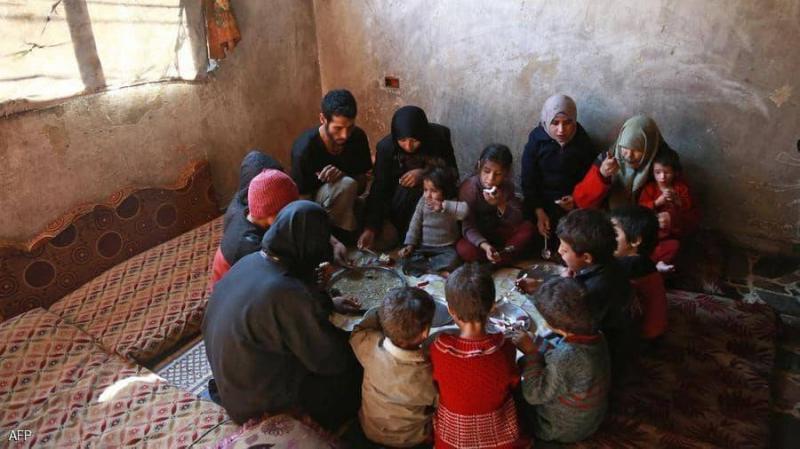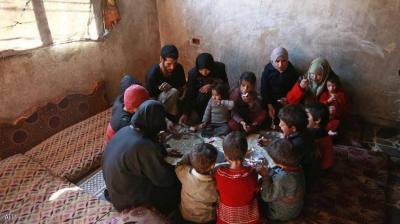Under the title "The Specter of Famine Haunts Millions of Syrians," Sky News Arabia reported that following the Security Council meeting which renewed the "UN mandate to deliver aid to Syria," restricting aid to the "Bab al-Hawa" crossing between Syria and Turkey, nearly five million Syrians living in northeastern Syria, under the control of the Syrian Democratic Forces, are losing hope for any change in their living conditions. The discussions among the Security Council members reached a deadlock due to Russia's refusal to approve a draft resolution proposed by Ireland and Norway that aimed to extend the UN mandate for delivering aid to Syria while also including the Al-Yaroubiah border crossing with Iraq alongside the "Bab al-Hawa" crossing with Turkey. Russia rejected all details of this proposal, prompting reports that the two proposing countries suggested the possibility of abandoning the Al-Yaroubiah crossing in exchange for Russian approval of the annual extension, as has been the norm since 2014.
Russia's main position focuses on delivering UN aid through Syrian areas and crossings to other regions of the country, which the international powers, particularly those bearing the major financial responsibility for providing aid—namely the United States, Canada, Japan, and the European Union—reject, as they view this as granting legitimacy to the Syrian government. Russia also proposed a six-month UN mandate, but only for negotiating the mechanism of aid delivery through areas controlled by the Syrian government. A compromise was reached today, whereby the United States and its allies conceded on the Al-Yaroubiah crossing issue in exchange for Russian approval for a full one-year extension.
The Euphrates region, which covers about a quarter of Syria's area and includes over five million Syrian citizens, is the only region that has not received international aid since the international mandate was approved in 2014. It is also the most impoverished and lagging in development within Syria and has been under an economic blockade by Turkey for years. Researcher at the Middle East Political Studies Center, Durgham Bahari, explained in an interview with Sky News Arabia the conditions surrounding the residents of the Euphrates area: "Living conditions in that area were adequate in the past years, but two compound factors have changed that. The American 'Caesar' sanctions prevented the self-administration in that area from selling oil products to the Syrian government, leading to the treasury of this administration, which managed hundreds of institutions and over a quarter-million public employees providing health, educational, and economic services, becoming nearly empty."
Bahari further stated, "Additionally, last year’s drought and reduced rainfall in that region deprived the broader social base from obtaining the minimum daily food necessities, and any field survey would confirm that the majority of the population does not get their natural caloric needs, especially in the southern and eastern districts of the area."
Russia insists on not allowing aid into this particular area to prevent further legitimacy and strength for the self-administration in northeast Syria, viewing it as the main political and military competitor to the Syrian government, which is allied with Russia. Furthermore, it considers the Euphrates region to be under the influence of the United States, and tightening the noose around it will prompt the American side to contemplate making concessions to Russia in order to ease the situation there, especially since the U.S. considers stabilizing the area part of its fight against terrorism.
The "Astana Group" negotiations, which include Russia, Iran, and Turkey, concluded their sixteenth round of meetings in the Kazakh capital "Nur-Sultan" yesterday, without addressing the issue of border crossings and the renewal of the UN mandate for delivering aid to Syria, which observers claim indicates an unannounced consensus among the three countries on this matter.
A high-ranking source from within the self-administration of northeast Syria clarified in an interview with Sky News Arabia their viewpoint, stating, "There are detailed indicators for us that say the three countries are completely aligned in besieging the Euphrates region and starving its population to extract political concessions from the Syrian Democratic Forces. The administration lacks leverage to advocate for its residents, aside from some roles that the United States does not actively exercise. However, everyone knows, especially the countries responsible for the flow of aid, that this type of economic pressure is a major driver for increasing violence levels and enhancing extremist organizations' ability to attract disillusioned youth, which is a matter that touches on the national security of all these countries, especially the United States and European Union nations."




